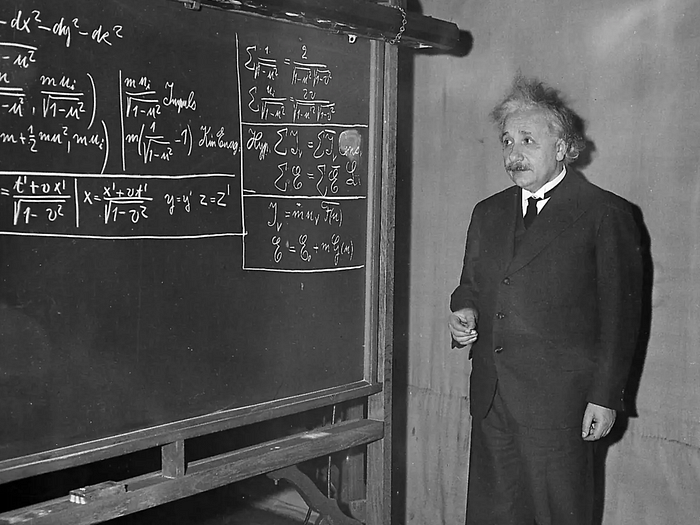Doing Science for Its Own Sake
 Albert Einstein (1879–1955)
Albert Einstein (1879–1955)
In the Jewish Sanhedrin, Rabbi Yehuda recognized that some believers perform their religious duties — mitzvahs, and pursue scholarship of the Torah’s teaching as ways for gaining external benefits. And so, he noted: “through repeatedly doing something not for its own sake, one eventually does it for its sake.” In other words, the routine practice of the duties, irrespective of motivation, would eventually lead to a deeper understanding of the meaning behind them.
The same rationale applies to the practice of science. Some practitioners pursue science as a tool for promoting their self-esteem and status, in the same way that athletes sprint the 100-meters dash in order to demonstrate that they are better than other athletes or to set the world record. Throughout the past forty years of my career as a practicing scientist, I met many practitioners, including some of the most prominent professionals in their field, who clearly pursue science for the benefit of honors, academic status or awards, that accompany scholarly excellence.
But for me, the prime motivation for pursuing physics is to understand something new about the physical reality that we all share. I am a theoretical physicist who routinely comes up with ideas of how to interpret existing data or to motivate gathering of new data, and I bow down to the superiority of experimental testing of my ideas as an essential part of gaining new scientific knowledge. This sense of humility comes with the territory of learning from nature, because our imagination is often biased and partial compared to the full scope of reality.
The proper pursuit of science involves leaving the scientist’s ego second to experimental evidence. Experience often shows that beautiful ideas which flatter the proposer’s ego, are removed by the guillotine of experiments. A recent example is supersymmetry, which was ruled out in its natural parameter space by data from CERN’s Large Hadron Collider.
Physical reality is under no obligation to represent the most beautiful or intellectually stimulating ideas. In principle, a simple-minded explorer could hypothetically discover an artifact from an extraterrestrial civilization as an interstellar meteor that lies on the bottom of the Pacific Ocean. Such a discovery would change the future of humanity even if it does not require advanced mathematics to describe it. In contrast, thousands of papers about the multiverse which describe regions of spacetime that we cannot visit through sophisticated equations that 99.99999% of humans on planet Earth cannot follow, might just boil down to intellectual gymnastics that have a negligible impact on the future of humanity. Nevertheless, they deliver bragging privileges to their proponents in the same spirit as the exploration of Thomas Aquinas’ question: “how many angels can dance on the head of a pin?”
In a recent group meeting at my office, I asked my students and postdocs: “What makes most theoretical physicists happy?” After a long silence, I answered the question myself: “Lack of experimental data.”
In other words, those theorists who use science as a tool for gaining status, honors or awards, would maintain a happy state of mind as long as their ideas are not ruled out by experiments. When new evidence appears to conflict their expectations, they would often be offended personally and seek “Ptolemaic epicycles” to keep their idea alive and well.
My response is different. After co-authoring a 2009 paper which predicted that no interstellar objects will be detected by the PanSTARRS observatory in Hawaii if exo-planetary systems resemble the Solar system, I was thrilled to learn about the discovery of `Oumuamua in 2017 . Being proven wrong provides the privilege of learning something new. A mistake represents Nature’s way of teaching us that we are missing something important. This lesson was repeated for me in another case. In anticipation of the Webb telescope, I co-wrote an extensive textbook titled “The First Galaxies in the Universe,” in 2012. When the Webb telescope started operations a decade later, I told reporters that as much as I would be happy if the predictions in my textbook are proven right, I will be even happier if we learn something new. For that reason, I celebrated the confirmation of the Higgs boson’s existence, which was theoretically proposed in 1964, by the Large Hadron Collider in 2012. But at the same time, I was hoping for a more significant discovery of something unexpected and qualitatively new in the decade that elapsed since then.
As scientists age and their self-esteem rises, they tend to lose their childlike curiosity and behave like “the adults in the room”, pretending to know answers in advance without seeking evidence. By arguing that “extraordinary claims require extraordinary evidence” while at the same time not seeking the evidence, their prejudice becomes a self-fulfilling prophecy. Under these circumstances, it is the duty of younger scientists to challenge cherished beliefs and reveal new knowledge. Last month I visited my elementary school and told the young students: “in my mind, I am still a child like all of you.” One of the kids asked how is that possible given that I am 61 years old. I explained that a “beginner’s mind” has nothing to do with biological age.
At this time, I am frustrated by those who hold strong opinions on whether we are alone in the cosmos. During his SpaceX Starship Update for 2024, Elon Musk motivated his initiative to settle on Mars by arguing that we bear responsibility for securing our long-term survival because there might not be anyone else like us in outer space. However, to scientifically substantiate this argument, Elon should have funded the experimental search for supporting evidence, such as the Galileo Project — which is engaged in seeking experimental data on extraterrestrial civilizations using state-of-the-art scientific instrumentation. I gave the latest update on the project in a public event last night.
Here’s hoping that Rabbi Yehuda’s insight will indeed apply to our future endeavors in pursuing answers to existential questions using the tools of science. Those who practice science for personal or commercial benefits, namely “not for its own sake”, might eventually “do it for its sake”.
ABOUT THE AUTHOR Image credit: Chris Michel (October 2023)
Image credit: Chris Michel (October 2023)
Avi Loeb is the head of the Galileo Project, founding director of Harvard University’s — Black Hole Initiative, director of the Institute for Theory and Computation at the Harvard-Smithsonian Center for Astrophysics, and the former chair of the astronomy department at Harvard University (2011–2020). He chairs the advisory board for the Breakthrough Starshot project, and is a former member of the President’s Council of Advisors on Science and Technology and a former chair of the Board on Physics and Astronomy of the National Academies. He is the bestselling author of “Extraterrestrial: The First Sign of Intelligent Life Beyond Earth” and a co-author of the textbook “Life in the Cosmos”, both published in 2021. His new book, titled “Interstellar”, was published in August 2023.







































